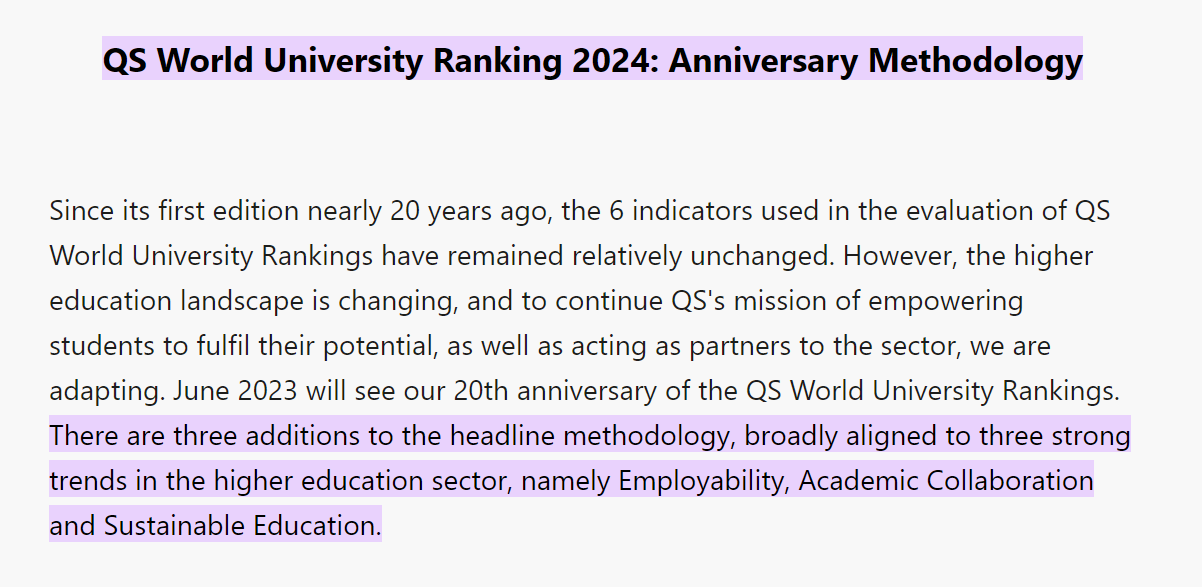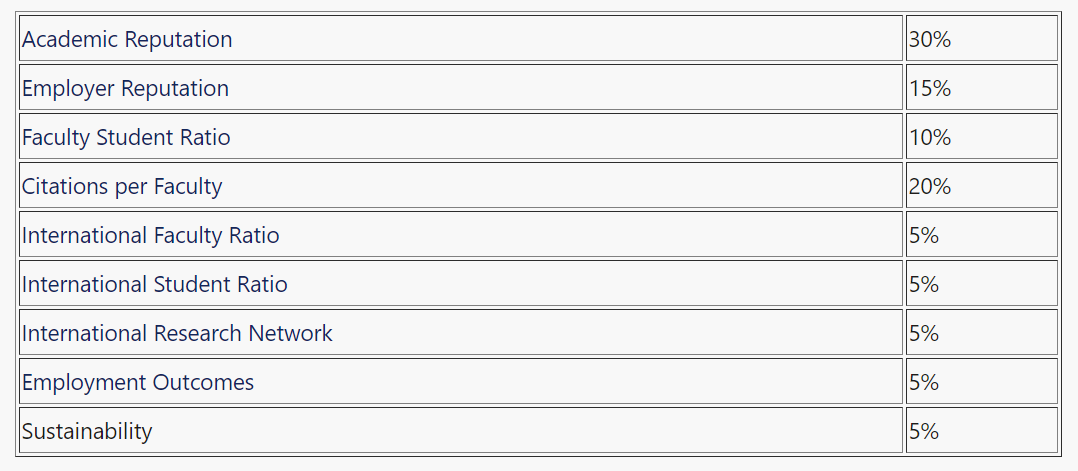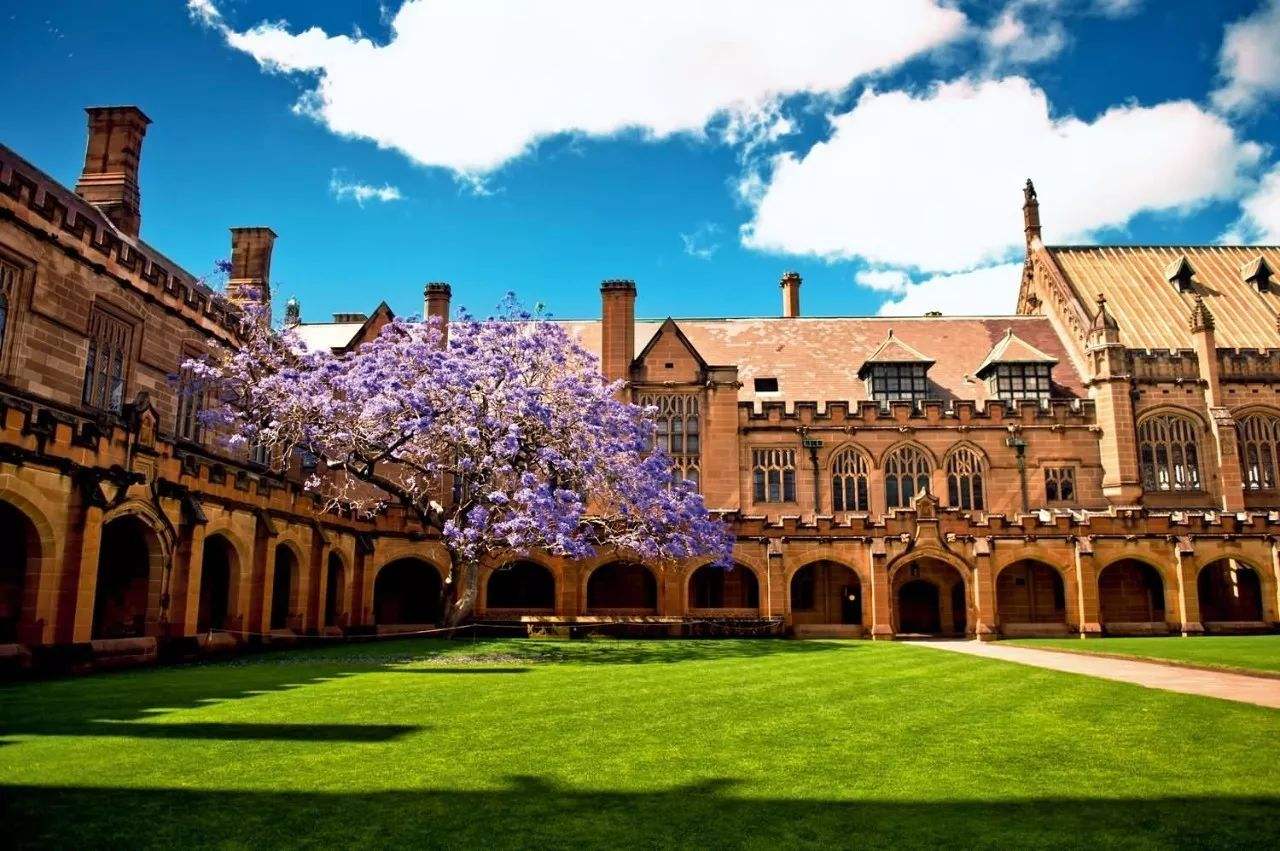
The QS World University Ranking is one of the most commonly used university rankings for international students and parents to refer to when making university choices. Recently, there is a news from QS official website, announcing that there are three additions to the headline methodology in order to adapt the changing higher education landscape.

About QS



QS World University Rankings is an annual ranking of world universities published by Quacquarelli Symonds (QS), a UK-based education organisation. The QS World University Rankings, together with the Academic Ranking of World Universities (ARWU), the Times Higher Education World University Rankings and the U.S. News & World Report Best Global Universities Rankings, are considered to be four most influential university rankings in the world.
What are the changes to the ranking scoring criteria?
Previously, universities were evaluated according to the following six metrics:
Academic Reputation (40%)
It illustrates not only the quality of the University's scientific research, but also the strength of the university in communicating that research, and the strength of the impact the research makes around the world.
Employer Reputation (10%)
It assesses how well universities can prepare students for successful careers and which universities offer the most capable, innovative and effective graduates.

Faculty-Student Ratio (20%)
As a proxy for the learning and teaching environment of a university, measuring the faculty-student ratio is the most effective proxy for the quality of teaching and learning.
Citations per Faculty (20%)
It is a measure of the relative intensity and volume of research being undertaken at an institution, indicating research strength.

International Faculty Ratio (5%)
It illustrates the diversity and collaboration of research and teaching, and the ability to attract talent from around the world.
International Student Ratio (5%)
It illustrates the richness of cultural exchange at an institution as well as the diversity of learning experiences.
Intended QS World University Rankings 2024 methodology will be:
• Academic Reputation: 30%, down 10%
• Employer Reputation: 15%, up 5%
• Faculty-Student Ratio: 10%, down 10%
• Citations per Faculty: 20%, unchanged
• International Faculty Ratio: 5%, unchanged
• International Student Ratio: 5%, unchanged
Three additions to the methodology, all at 5%
• International Research Network: analyses international research collaborations and measures the diversity of the University's network of international partnerships.
• Employment Outcomes: reflects employability for institutions’ graduates.
• Sustainability: assesses the social and environmental impact of the university as a centre for education and research.

Overview of QS World University Rankings 2023

Changes in indicators will lead to different rankings of universities, and we will see which universities will rise and which will fall in June 2023, the 20th anniversary of the QS World University Rankings. For now, let's take a look back at the World University Rankings 2023.
*Figures in brackets below indicate rankings

The United States
A total of 27 US universities are ranked in the world's top 100 in this ranking, with MIT taking the top spot for the 11th consecutive year. Although most US university rankings have dropped, Stanford University (3), Harvard University (5), California Institute of Technology (6), University of Chicago (10), University of Pennsylvania (13), Princeton University (16), Yale University (18) and Cornell University (20) remain in the world's top 20.

Canada
Three Canadian universities are ranked in the world's top 100, with McGill University being the highest ranked university in Canada at 31st in the world. The other two universities are the University of Toronto and the University of British Columbia, ranked 34th and 47th respectively.

Australia
Among the top 100 universities in the world, seven Australian universities were in the list and were the same as last year, which are the Australian National University (30), University of Melbourne (33), the University of Sydney (41), University of New South Wales (45), the University of Queensland (50), Monash University (57) and the University of Western Australia (90).

China
Two of the top 20 universities in the QS World University Rankings 2023 are from China, which are Peking University (12) and Tsinghua University (14). Besides, there are Fudan University (34), Zhejiang University (42), Shanghai Jiao Tong University (46) and University of Science and Technology of China (96) in top 100 universities.

Singapore
The National University of Singapore is ranked 11th and is the highest ranked university in Asia. Nanyang Technological University is also among the top 20 in the world, being 19th.

The United Kingdom
Four of the top 10 universities in the 2023 QS World University Rankings are from the UK, namely University of Cambridge (2), University of Oxford (4), Imperial College London (6) and University College London (8). In addition to these four universities, there are a total of 17 UK universities in the top 100, including the University of Edinburgh (15), the University of Manchester (28), King's College London (37), the London School of Economics and Political Science (56) and the University of Warwick (64).

As we can see from the above figures, the UK is home to many of the world's leading higher education institutions and is a global hub for top quality education resources. The UK institutions enjoy a strong reputation for not only delivering high quality diplomas that are internationally recognised, but also consistently leading the world in academic and scientific research. This makes the UK one of the most popular destinations for Chinese students to study abroad. However, for many students, choosing the right university and major among the many universities has become a challenge.

Top 100 universities in the QS World University Rankings 2023

Source: QS World University Rankings official WeChat account

